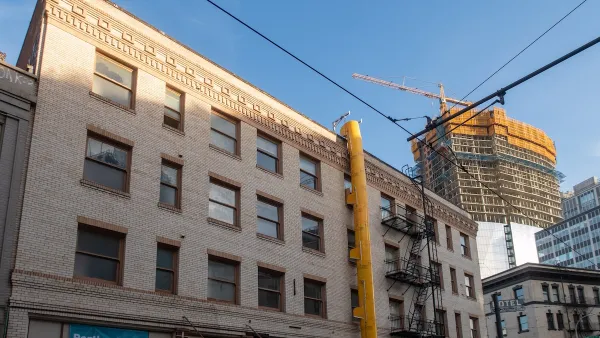The city of Portland is considering a new inclusionary zoning policy, but some believe that inclusionary zoning has the opposite of its intended effect.

The debate about inclusionary zoning as a policy solution for housing affordability shifts to Portland, Oregon, where the city is beginning to consider the terms of a new inclusionary zoning policy.
The inclusionary zoning policy is up for debate following a decision by the state to repeal a statewide ban on inclusionary housing requirements. With Portland ready to consider a new inclusionary zoning policy, the Northwest Chapter of the Urban Land Institute recently held a forum to discuss inclusionary zoning, which Joe Cortright attended as a panelist.
Cortright shares a few of his talking points, some of which he’s made in the past, which focus on the idea that inclusionary zoning might not be an effective tool to improve housing affordability.
The bigger concern about inclusionary zoning is that it tends to drive up the cost of building new housing, thereby restricting supply, and actually aggravating market-wide affordability problems. While the comparative handful of new units set aside for low or moderate income households are visible, there is an invisible cost in the form of units not built, and consequently, higher market rents for everyone.
Mike Wilkerson of ECONorthwest also participated in the event, presentinga summary of his firm’s recent analysis of inclusionary policies (commissioned by the Urban Land Institute), which joins a growing joins what Cortright describes as a “growing body of research that attempts to model current development costs and the impacts of inclusionary (and other) requirements on the cost and likelihood of housing development.” One of the takeaways that Cortright has identified from all this research is a great deal of uncertainty over the effects of policy changes, like inclusionary zoning, and the future of the development market.
FULL STORY: Portland considers inclusionary zoning

Maui's Vacation Rental Debate Turns Ugly
Verbal attacks, misinformation campaigns and fistfights plague a high-stakes debate to convert thousands of vacation rentals into long-term housing.

Planetizen Federal Action Tracker
A weekly monitor of how Trump’s orders and actions are impacting planners and planning in America.

San Francisco Suspends Traffic Calming Amidst Record Deaths
Citing “a challenging fiscal landscape,” the city will cease the program on the heels of 42 traffic deaths, including 24 pedestrians.

Defunct Pittsburgh Power Plant to Become Residential Tower
A decommissioned steam heat plant will be redeveloped into almost 100 affordable housing units.

Trump Prompts Restructuring of Transportation Research Board in “Unprecedented Overreach”
The TRB has eliminated more than half of its committees including those focused on climate, equity, and cities.

Amtrak Rolls Out New Orleans to Alabama “Mardi Gras” Train
The new service will operate morning and evening departures between Mobile and New Orleans.
Urban Design for Planners 1: Software Tools
This six-course series explores essential urban design concepts using open source software and equips planners with the tools they need to participate fully in the urban design process.
Planning for Universal Design
Learn the tools for implementing Universal Design in planning regulations.
Heyer Gruel & Associates PA
JM Goldson LLC
Custer County Colorado
City of Camden Redevelopment Agency
City of Astoria
Transportation Research & Education Center (TREC) at Portland State University
Jefferson Parish Government
Camden Redevelopment Agency
City of Claremont




























